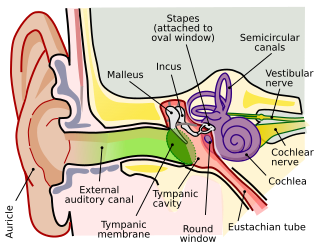Ototoxic medication
Ototoxic Medication[edit]

Ototoxic medications are drugs that have the potential to cause damage to the ear, specifically the cochlea or auditory nerve, leading to hearing loss or tinnitus. These medications can affect the inner ear structures responsible for hearing and balance, and their effects can be temporary or permanent.
Mechanism of Ototoxicity[edit]
Ototoxicity can occur through various mechanisms depending on the class of medication. Some drugs may directly damage the hair cells in the cochlea, while others may interfere with the blood supply to the inner ear or disrupt the electrolyte balance within the ear's fluid compartments.
Aminoglycosides[edit]

Aminoglycosides, such as gentamicin and streptomycin, are antibiotics that can cause ototoxicity by binding to the ribosomal RNA of bacteria, inhibiting protein synthesis. This action can also affect the mitochondria of human cells, leading to the production of reactive oxygen species that damage cochlear hair cells.
Chemotherapeutic Agents[edit]

Chemotherapeutic agents like cisplatin and carboplatin are known to cause ototoxicity. These drugs can induce apoptosis in cochlear cells by forming DNA adducts and generating oxidative stress, leading to cell death and hearing loss.
Loop Diuretics[edit]
Loop diuretics, such as furosemide, can cause ototoxicity by altering the ionic composition of the endolymph in the cochlea. This disruption can lead to edema and damage to the hair cells, resulting in hearing impairment.
Non-Steroidal Anti-Inflammatory Drugs (NSAIDs)[edit]

NSAIDs, including aspirin and ibuprofen, can cause reversible ototoxicity. They inhibit the cyclooxygenase (COX) enzymes, reducing the production of prostaglandins, which can affect cochlear blood flow and lead to temporary hearing loss.
Symptoms of Ototoxicity[edit]
The symptoms of ototoxicity can vary depending on the drug and the individual. Common symptoms include:
- Tinnitus (ringing in the ears)
- Hearing loss, which can be unilateral or bilateral
- Vertigo or balance disturbances
- A feeling of fullness in the ears
Prevention and Management[edit]
To prevent ototoxicity, it is important to monitor drug levels and adjust dosages appropriately. Regular audiometric testing can help detect early signs of hearing loss. In some cases, alternative medications with lower ototoxic potential may be used.
Management of ototoxicity involves discontinuing the offending drug if possible and providing supportive care. Hearing aids or cochlear implants may be necessary for those with significant hearing loss.
Related Pages[edit]
Ad. Transform your life with W8MD's Budget GLP-1 injections from $75


W8MD offers a medical weight loss program to lose weight in Philadelphia. Our physician-supervised medical weight loss provides:
- Weight loss injections in NYC (generic and brand names):
- Zepbound / Mounjaro, Wegovy / Ozempic, Saxenda
- Most insurances accepted or discounted self-pay rates. We will obtain insurance prior authorizations if needed.
- Generic GLP1 weight loss injections from $75 for the starting dose.
- Also offer prescription weight loss medications including Phentermine, Qsymia, Diethylpropion, Contrave etc.
NYC weight loss doctor appointmentsNYC weight loss doctor appointments
Start your NYC weight loss journey today at our NYC medical weight loss and Philadelphia medical weight loss clinics.
- Call 718-946-5500 to lose weight in NYC or for medical weight loss in Philadelphia 215-676-2334.
- Tags:NYC medical weight loss, Philadelphia lose weight Zepbound NYC, Budget GLP1 weight loss injections, Wegovy Philadelphia, Wegovy NYC, Philadelphia medical weight loss, Brookly weight loss and Wegovy NYC
|
WikiMD's Wellness Encyclopedia |
| Let Food Be Thy Medicine Medicine Thy Food - Hippocrates |
Medical Disclaimer: WikiMD is not a substitute for professional medical advice. The information on WikiMD is provided as an information resource only, may be incorrect, outdated or misleading, and is not to be used or relied on for any diagnostic or treatment purposes. Please consult your health care provider before making any healthcare decisions or for guidance about a specific medical condition. WikiMD expressly disclaims responsibility, and shall have no liability, for any damages, loss, injury, or liability whatsoever suffered as a result of your reliance on the information contained in this site. By visiting this site you agree to the foregoing terms and conditions, which may from time to time be changed or supplemented by WikiMD. If you do not agree to the foregoing terms and conditions, you should not enter or use this site. See full disclaimer.
Credits:Most images are courtesy of Wikimedia commons, and templates, categories Wikipedia, licensed under CC BY SA or similar.
Translate this page: - East Asian
中文,
日本,
한국어,
South Asian
हिन्दी,
தமிழ்,
తెలుగు,
Urdu,
ಕನ್ನಡ,
Southeast Asian
Indonesian,
Vietnamese,
Thai,
မြန်မာဘာသာ,
বাংলা
European
español,
Deutsch,
français,
Greek,
português do Brasil,
polski,
română,
русский,
Nederlands,
norsk,
svenska,
suomi,
Italian
Middle Eastern & African
عربى,
Turkish,
Persian,
Hebrew,
Afrikaans,
isiZulu,
Kiswahili,
Other
Bulgarian,
Hungarian,
Czech,
Swedish,
മലയാളം,
मराठी,
ਪੰਜਾਬੀ,
ગુજરાતી,
Portuguese,
Ukrainian